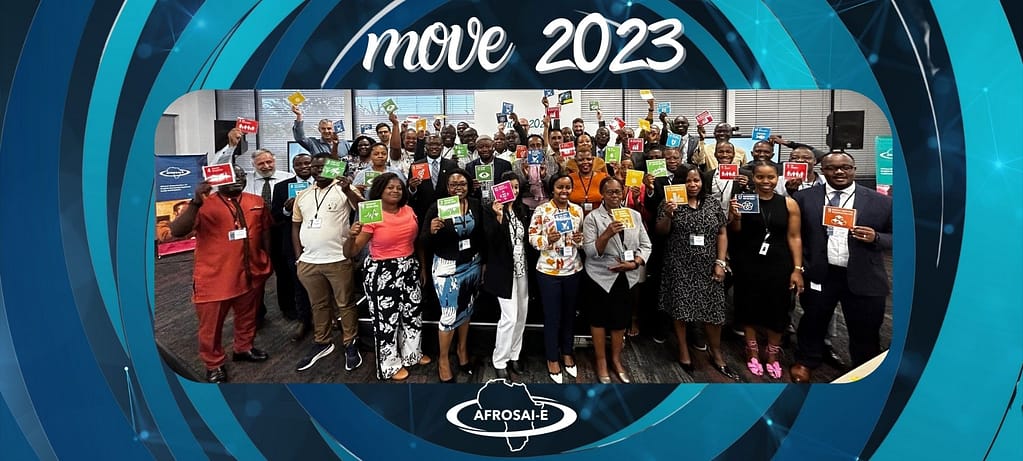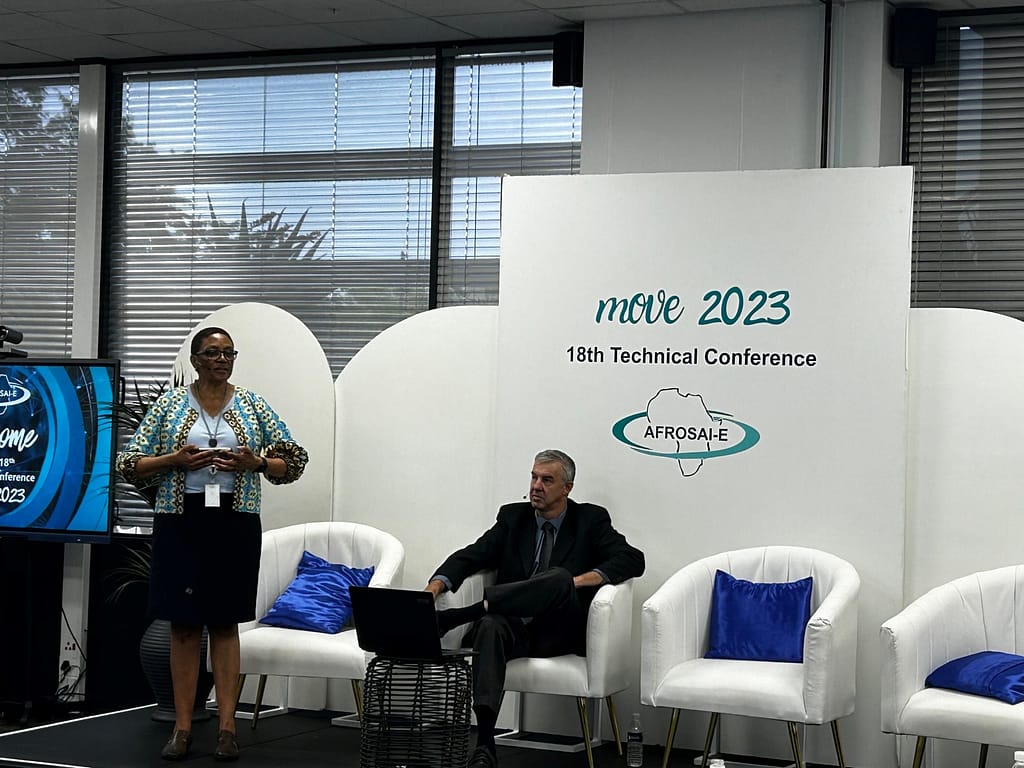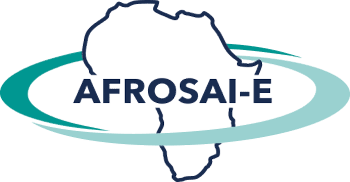
Move 2023 – 18th AFROSAI-E Technical Conference
Our first full hybrid Technical Conference took place from 7 to 9 November 2023. Over 40 participants attended the event in person, and close to 200 unique viewers joined us online. Interest in our annual conference has grown over the years, both within our region and globally. The hybrid event enabled us to reach more SAI staff while hosting a cost-effective conference.
Continuing pressure on SAIs to stay ahead of the curve and remain relevant requires transformation. This is why this year’s conference theme was MOVE.
MOVE 2023 kicked off with a keynote address by Joseph Asunka, the CEO of Afrobarometer. His address focused on citizen perspectives on the state of the continent. As a pan-African survey research organisation, Afrobarometer has reliable insights into African citizens’ experiences, evaluations and aspirations regarding democracy, governance and quality of life. He highlighted that most countries are worse than four years ago on the corruption index. Given the aspiration of SAIs to make a difference in the lives of citizens, Joseph’s reflections on citizens’ perspectives set an appropriate tone for the following sessions and the important role of SAIs in contributing to good financial governance in Africa.
In line with the Conference theme, plenary discussions focused on the tools, initiatives and innovations that enable and empower SAIs to move forward. The AFROSAI-E Institutional Capacity Building Framework (ICBF) is a tool that enables SAIs to understand their capacity-building needs and priorities.
The first plenary session kicked off with an in-depth view of the key cross-cutting challenges highlighted by the ICBF State of the Region report. This session then continued to elaborate on the necessity of SAIs understanding the fundamental ‘building blocks’ they need to have in place to enable transformation.




Transformation was in the spotlight on the 2nd day, focusing first on the roadmap towards digital transformation before shifting to the SAI professionalisation journey. Mr Tichaona Zororo, Director at Enterprise Governance of IT (EGIT), challenged participants during his keynote address to leverage data in all the SAI’s operations. This message was echoed by the expert panellists, including Justus Ongera (WGISAM Chair from SAI Kenya), Phila Ndarana (Chief Technology Officer from SAI South Africa) and Pramesh Bhana (Sherpa Enterprise). Key takeaways from the panel discussion on digitalisation included:
- SAIs must have a strategy and adequate responsibilities for digitalisation in the SAI.
- SAI leadership must drive digitalisation.
- Collaboration between SAIs is necessary to optimise investments in digitalisation.
- Change management is important so no one feels like they are being left behind.
- Digitalisation is both about capability and capacity building.
- Just start. Don’t design for perfection; instead, be agile and reflect, refine, redo and replicate, as this will yield better results.
- Lift, shift and share. Extract capabilities and experiences that work and deploy these successes elsewhere. Also, share or make these successes accessible to strengthen the capabilities and capacities of fellow SAIs, stakeholders and auditees (without compromising independence).

In keeping with the theme of movement, the next session focused on the journey of professionalising SAI staff and producing quality audits. Each SAI’s pathway to professionalisation is different based on its country context and environmental factors. This session opened the floor for SAIs to share their unique country circumstances and the challenges hindering professionalisation. Sharing their specific perspectives were Faithmary Manyangadze (Acting DAG Zimbabwe), Martin Bamulumbye (Director, SAI Uganda) and Alta Prinsloo, the CEO of the Pan African Federation of Accountants (PAFA). Key takeaways from the session were:
- SAIs don’t have to start “big”. Instead, start with what is possible.
- It is a long-term process that needs SAI leaders to steer the strategy. Results are not immediate.
- The benefits of professionalisation include quality of work and seamless integration of audit methodologies.
- Challenges SAIs experience include staff retention, lack of financial and human resources, and competing with the private sector regarding remuneration for qualified professionals.
- SAIs can become training offices for the profession by partnering with a Professional Accountancy Organisation (PAO).
- Support staff, such as legal and ICT officers, should also be professionalised.
The panel discussion on quality audits featured an in-depth look at the difficulties and solutions associated with implementing quality management and a high-level look at the impact of SAI audits. The diverse panel included Jamie Patterson from the UK National Audit Office, Edna Mtili from SAI Tanzania and Steven Safari from SAI Rwanda.




Day three started with a presentation by Jan van Schalkwyk from SAI South Africa (INTOSAI Capacity Building Committee (CBC) Chair) on the outcomes of the annual CBC meeting. The focus then shifted to the Sustainable Development Goals (SDGs). The session started with a highly interactive session facilitated by the Canadian Audit and Accountability Foundation (CAAF) on demystifying the audit of the SDG implementation. The top ten tips they shared with participants were:
- Consider the level at which you can integrate SDGs into your audit.
- Don’t wait for the government to be ready before auditing.
- Use existing structures and systems.
- Add an SDG lens to audit topic selection and multiyear planning process.
- Keep scope manageable.
- “Leave No One Behind” may already be part of audit scope considerations.
- Refer to other SDG audits.
- Remember that national targets can be customised.
- Data will lead the way.
- Talk to financial auditors.
2020 Marked the start of the Decade of Action to deliver the SDGs by 2030. New technologies will be essential for achieving the SDGs as they offer a solution to the urgent need for accelerated progress to fulfil the goals by 2030. Our panel of experts who reflected on the initiatives that are aiding SAIs to drive SDG achievements globally included Vivi Niemenmaa (Secretary General of the WGEA), Archana Shirsat, Deputy Director in the INTOSAI Development Initiative) and Adriano Martins Juras from SAI Brazil (INTOSAI ClimateScanner initiative). Yester Salala from SAI Tanzania also shared valuable lessons learnt from the AFROSAI-E coordinated SDG audit project they are participating in.
The key takeaways from the session on the SDG included:
- The audit of SDG implementation should ideally include all audit methodologies, not just performance audits.
- SAIs shouldn’t see SDG integration into audits as daunting; they can do so gradually.
- SAIs can and should be able to carry out audits of SDG implementation without preparedness audits.
- SAIs should participate in joint audits to encourage peer-to-peer learning, learning through benchmarking and contributing to a common voice on citizen-cantered audits.




With citizens’ priorities and service delivery specifically being a big discussion focus of the Conference, it was fitting that we also launched the exposure draft of our first Local Government Auditing Guideline. Click here to learn more about it. The extractive industries sector can also significantly affect the lives of citizens. The conference’s final session saw the launch of two new products on Extractive Industries audit. The first exciting development was the launch of the new Extractive Industries Audit Guideline (3rd Edition). Click here to watch the short summary video that explains the significant changes and additions to the Guideline. Secondly, we introduced a brand-new initiative on Extractive Industries Sector Groups, a systematic approach for SAIs to monitor continuously what is happening in the EI sector.

